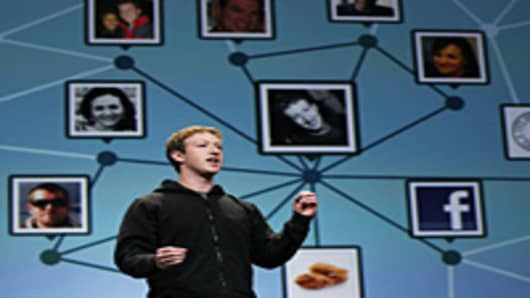Facebook CEO Mark Zuckerberg has rarely been one to take his company the traditional or least disruptive route, and that ideology is not lost on Wall Street.
Some banks looking to get a piece of the company’s highly anticipated offering have been developing and pitching unconventional strategies for the company to go public, according to people familiar with the matter.
But behind closed doors, the company is leaning towards a more traditional and conservative approach, these people said.
The carrot to do something unique is a large one. Creating a bespoke retail market via Facebook’s 800 million-plus users is one potentially lucrative option for bankers, and more than one bank has been poring over ways Facebook could leverage that community as part of an offering. Facebook management has rebuffed those suggestions numerous times, according to people familiar with the company’s thinking, maintaining that forcing the offering on its user base would be largely inappropriate — not to mention overly risky.
The controversial strategy to offer IPO shares directly to a company’s customer or user base has carried out before, with largely unsuccessful results. Two of the more famous instances include Boston Beer, which back in 1995 offered stock to its loyal barflies via Sam Adams beer bottles.
And the phone-service Vonage, which allowed its subscribers access to pre-IPO shares as part of its 2009 offering. The strategy backfired visibly, both for companies and the banks involved, resulting in tumbling stock prices or multi-million dollar lawsuits.
While Facebook is leaning towards a more traditional approach to going public, it is still considering ideas it has solicited from bankers that would incorporate some type of unique component as part of going public, according to people familiar with the matter.
In that respect, the company has discussed a wide-range of possibilities including private placements, Dutch auctions (a form of electronic offering made famous by Google’s 2004 IPO), or a combination of the two, according to these people, though largely preferring risk-averse strategies.
Facebook declined to comment on the discussions.
Regardless of the strategy they choose, banker fees on the offering are likely to be low. As competition ramps up, it is not uncommon for prospective underwriters to slash their pay in order to curry favor on a hot deal.
General Motors’ mammoth $20 billion IPO back in 2010 saw Goldman Sachs and other underwriters sign up for historically low pay rates.
According to data from Dealogic, fees of more than 6 percent were the norm last year on smaller deals of $1 billion or less. Those rates tumble the larger a deal goes, and average a paltry 2.2 percent on IPOs of $10 billion or more in size. Though the rate is low, super-sized deals could still mean hundreds of millions in potential revenue for the banks involved.
Follow Kayla Tausche on Twitter: @KaylaTausche
Follow Jesse Bergman on Twitter: @JBergmanCNBC
"Mark Zuckerberg: Inside Facebook" will premiere on Thursday, January 26, 2012 on CNBC.



